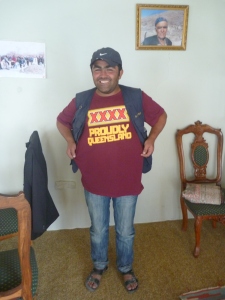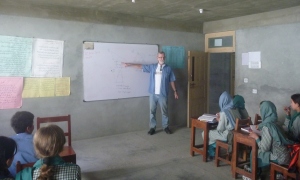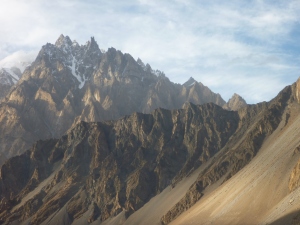The Glacier Breeze Restaurant sat like an eyrie on the top of one of the many rocky outcrops that litter the local landscape.Unable to see an obvious path to the top, a figure appeared from inside and pointed to what I had thought was a drainage canal. Apparently, it was the “road” to the parking area just behind the restaurant. After negotiating the narrow, water-filled gravel track I was met by Tanweer, the manager.
I could not believe my eyes when I saw the T-shirt he was wearing. In large letters across the front it read: “XXXX: Proudly Queensland”. Passu is considered remote even by Pakistani standards let alone by Australian standards. I immediately felt at home!
Tanweer’s brother, Khan, produced a pot of coffee and some apricot cake while Tanweer explained how he had come by his parochial T-shirt. Apparently he had an uncle who had migrated to Australia and now lived in Brisbane. On a recent visit back to Passu his uncle had brought the T-shirt with him as a souvenir of his adopted home. I don’t think Tanweer realised it was advertising beer though!
Even though the Glacier Breeze was a restaurant and not a hotel, Tanweer and Khan invited me to stay if I was happy to sleep on the floor. Given that the alternatives were either much more expensive or much less appealing or both, I gratefully accepted their offer and set up camp in the far corner of their dining room.
As well as running the restaurant, the two brothers ran a trekking guide business. But, like everywhere else, the flow of foreign tourists had almost completely dried up. The restaurant was capable of seating about 30-40 people but on the first night I was the sole diner.
Throughout my travels I am being continually asked my profession. As few people have any idea what a geochemist or a laboratory manager is, I simply tell people I am a retired teacher. I am grey enough to be retired and I am no longer a teacher so the description is a reasonable approximation of the truth. There are a couple of advantages to this little bending of the truth. The first is that everybody knows what a teacher is and thus requires no further explanation. The second is that teachers are still a respected part of the community here. Combined with the inherent respect usually given to elders in Pakistan, this means that I am often treated with great humility and many people invite me to have chai with them in their home.
It also means I get invited to visit schools. One such school was the community school in Passu. With a morning free of obligations, Khan (who seemed be head of the local P&C) took me to see the school that the village had literally built themselves using their own labour and materials. The commitment to providing education for the village children was amazing.
I was shown a number of primary classes. One class was a Year 5 class. All were very keen to show me their work. By coincidence it was a science lesson. I was astounded to see that the students had studied, in impressive detail, the complete digestive system of the human body, the structure of the heart, the structure of a cell and the phases of the moon. Each of these topics was accompanied by very detailed hand-drawn diagrams. Many Year 8 students in Australia would struggle to produce work of an equivalent standard.
After leaving the primary school, Khan and I walked the 2-3km up to the secondary campus. Again I was shown around the school and the Principal introduced me to a Year 8 Maths class as a “Maths teacher from Australia”. I asked the class what they were studying and they replied that they had just started “Triangles”. I was completely taken aback when the Principal then asked me to give an impromptu lesson on triangles. What was that about the six P’s of teaching? Proper Preparation Prevents P**s Poor Performance!
After a 10 minute introduction on the properties of the main types of triangles the Principal decided he’d seen enough. I don’t know if I would have got my Pakistani teacher’s registration but he did insist that the class copy down my boardwork into their notebooks!
I couldn’t have been too bad though as I was invited to come back as a volunteer teacher. And when I told them my wife was also a teacher they thought they would get two for the price of one. I had to respectfully decline their heart-felt offer.
The overwhelming impression I got from the school was that the students were highly motivated and saw education as an opportunity to make a better life for themselves compared to their parents, many of whom had little formal education. Education was a privilege that many of their parents didn’t enjoy.
With my morning’s supply teaching over, Khan and I walked back to the Glacier Breeze and ate a modest lunch of green tea and more apricot cake.
The afternoon was spent gazing at the scenery. The mountains and the glaciers seemed close enough to touch. Within spitting distance of the restaurant were Passu Peak (7285m) and Shisper (7610m) At the restaurant’s back door was Passu Glacier and just up the road, near the secondary campus, was Batura Glacier – a so-called “black” glacier due to the huge amount of silt and rock that it carries.
That evening there were five other guests at the restaurant. Two of them were young Pakistani males who seemed to get sillier as the night progressed. That’s when I noticed they were mixing their Coke with a clear liquid from what looked like a soy sauce bottle. It finally dawned on me that they were slowly getting drunk. This was the first time in nearly four weeks in Pakistan that I had seen alcohol being consumed in public. It turned out that the mysterious clear liquid in the soy sauce bottle was in fact a type of rice whiskey/rot-gut/rocket fuel popular with all the Chinese road workers.
Eventually all the guests vacated my bedroom and, as I unrolled by bedding, I thought back over the morning’s visit to the school. I was amused by how teachers’ staffrooms are the same all over the world.
Tomorrow I would leave my little bit of Queensland transplanted into the Karakoram Range and head for Sost – the last stop before the Chinese border.



Comments
Post a Comment